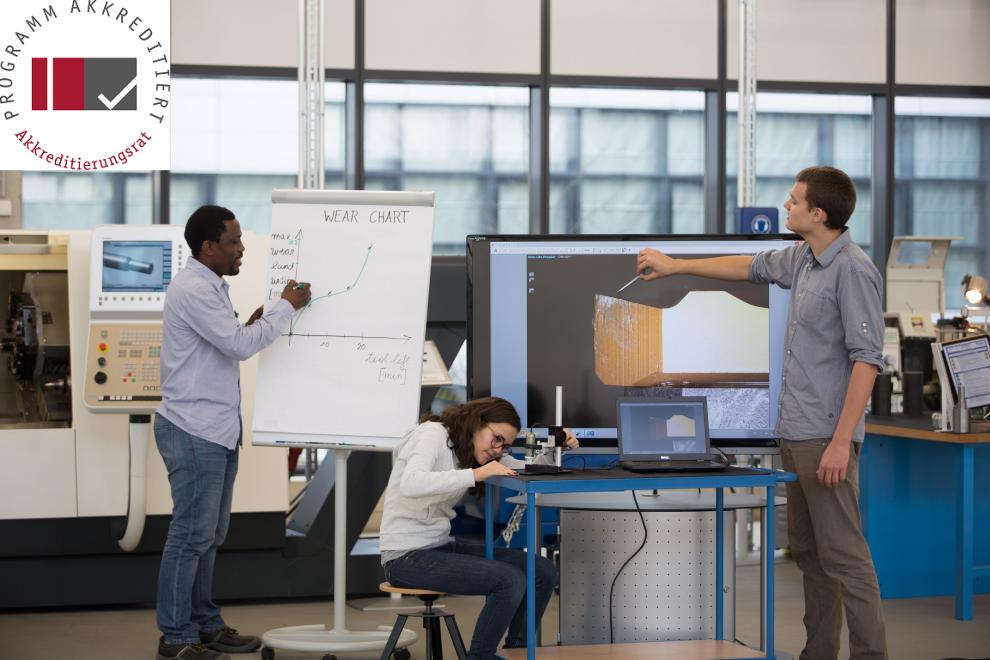Industrial Engineering*

Enrolled students find important information about how this affects their studies here.
Facilitators between two worlds
Industrial engineers are more than just engineers – they’re intermediaries between the worlds of business and science. Due to their broad training both in engineering and scientific disciplines, as well as economics, they are able to solve complex, interdisciplinary defined problems with interaction of technical feasibility and economic success. The Industrial Engineering study course was originally conceived to ensure sound training for junior staff in enterprises. Today industrial engineers are recognised for being substantially educated, and as a result hold key positions in international technology-oriented commercial enterprises.
Our Industrial Engineering undergraduate course places emphasis not only on the combination of the basic subjects of economics and technically, but goes far beyond this.
Course Structure
The Course Structure can be found here.
The structure of the Industrial Engineering B.Sc. course is derived directly from the typical structure and organization of technological enterprises and the career profiles which can be found there. In the first semesters the foundation is set by the teaching the basis of scientific engineering and economics. Building on this the core subjects are taught, relevant to functions within a commercial enterprise, beginning with technical purchasing, over innovation and production development processes, the actual production, and on to technical marketing and sales. In order to meet the very high standards demanded of internationality and interdisciplinarity, subjects such as conflict management, intercultural management and entrepreneurship will be covered, and the students will a wealth of soft skills. The final touch to the knowledge and skills required to qualify for demanding tasks in companies is imparted through subjects such as innovation and technology management, project management and general management.
Career Paths
A wide variety of vocational opportunities are open for Industrial Engineers. Characterising for future activities are again and again the interface between technology and economics, as well as concentration on analysis, solution identification and management of demanding challenges.
Typical fields of activity are:
- Technical purchasing in the conflict between costs and quality
- Technical sales in the conflict between the demands of the customer and the interest of the company
- Production and logistics in conflict between low stocks, short delivery times, lowering costs, as well as high reliability and quality
- The management of larger technically and organisationally demanding projects
- Organization and leadership of functional divisions and entire enterprises
- Management consultation etc.
Typical industries for industrial engineers are the energy and environmental technology, the automobile industry and it’s supporting industries, machine and equipment construction, medical technology, pharmaceutical industry as well as the entire service and consulting sector.
As a graduate of the course Industrial Engineering an enormous job market with excellent long-term vocational perspectives is opened for you.
* The degree programmes offered are suitable for part-time study in accordance with §62a HG NRW.
Quicklinks
Information
Place of study
Campus Kleve
Start date
Winter semester
Language
English
Duration of study
7 semesters of full-time study
Study model
Full-time studies
Degree awarded
Bachelor of Science
Internship
Mandatory 8-week preparatory internship/work placement. This must be completed no later than the 4th semester enrolment deadline.
Restricted admission
No
Questions about
Industrial Engineering B.Sc.:
Heads of the Degree Programme
Prof. Dr.-Ing. Dirk Untiedt
Phone: +49 (2821) 80673-609
technology-bionics@hochschule-rhein-waal.de
or
Prof. Dr. Dirk Berndsen
Phone: +49 (2821) 80673-660
technology-bionics@hochschule-rhein-waal.de
Questions about applying:
Student Advisory Service
Phone: +49 (2821) 80673-360

